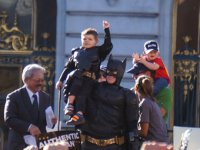San Francisco Bat Kid: A Model PBL Project
We have all been inspired by the San Francisco Bat Kid! To fully grasp what happened in that city in mid-November, watch these videos. It isn't every day that you see so many volunteers coming together to make a child's wish come true. In truth, creating that entire scenario for the San Francisco Bat Kid was a model PBL project.
A team at Make-a-Wish Foundation was present with this project, which in turn facilitated a Need to Know:
- How will we coordinate appropriate volunteers?
- What scenarios can we create?
- How can we craft a costume for the kid?
I'm sure these are only a few of the many questions that a team had to investigate to make the child's wish come true. The team collaborated, and its members were given voice and choice on how to craft the day for Bat Kid. And wow, what a public audience! Countless YouTube views, webpage views, and retweets! Not to mention the people of San Francisco who showed up to cheer on Bat Kid! What can we learn from this incredible and inspirational project as we implement PBL projects in our classrooms?
Partner with Charity and Service Organizations
Many great teachers partner with local, national and international organizations that are working toward serving others in need. A PBL project can easily be designed to work with these organizations. If you are wondering how to do this, I encourage to take this simple step: just ask! Often we perceive walls that aren't there. "That organization won't have the time to work with me." "I'll never get through to the appropriate person." Don't let these sentiments get in the way. Send an email, call the phone number, and try to get in touch. The worst that could happen is someone saying "no," but the best just might be an amazing PBL project that can make a world of difference, not only to whatever population the organization is serving, but also in the lives of your students.
Integrate Service Learning
There are actually specific components to service learning that you may or may not know about. Part of service learning often includes place-based learning, where students can see intersections of learning by doing authentic fieldwork and partnering with community stakeholders. In addition, service learning has a specific and targeted connection to class content. Both inform each other -- the content is learning to support the service, and the service learning drives the learning content. Service learning can support and develop student empathy and promotes a social justice ethic. Extend the learning beyond the classroom with service learning.
Real World Products and Services
It's easy to default to a fundraiser or volunteering to support an organization, and while those activities are certainly a good start, we should consider more possibilities. Ask service and charity organizations how students can actually create products that would be used. These products might create awareness about a cause or issue, target demographic groups whose involvement would be beneficial, or even express emotions from the point of view of those being served. Think outside the box as to what your students can create. Wouldn't it be amazing if students helped design something as extensive as Bat Kid's entire day?
Consider how we could enhance PBL when looking at #SFbatkid as a project model. We can create projects that have real-world impact, develop empathy and caring in our students, and demand collaboration beyond the physical classroom and school. Don't let the classroom confine you. Dream big with your students! How will you take your PBL projects up a notch?
